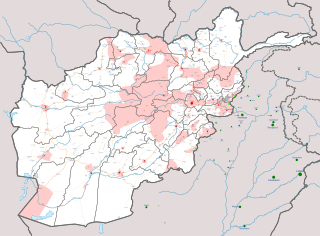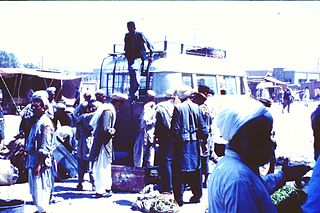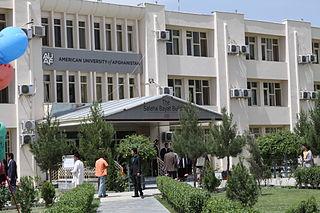August 2016 Kabul attack may refer to:
| This disambiguation page lists articles associated with the title August 2016 Kabul attack. If an internal link led you here, you may wish to change the link to point directly to the intended article. |
August 2016 Kabul attack may refer to:
| This disambiguation page lists articles associated with the title August 2016 Kabul attack. If an internal link led you here, you may wish to change the link to point directly to the intended article. |

The Taliban insurgency began after the group's fall from power during the 2001 War in Afghanistan. The Taliban forces are fighting against the Afghan government, formerly led by President Hamid Karzai, now led by President Ashraf Ghani, and against the US-led International Security Assistance Force (ISAF). The insurgency has spread to some degree over the Durand Line border to neighboring Pakistan, in particular the Waziristan region and Khyber Pakhtunkhwa. The Taliban conduct low-intensity warfare against Afghan National Security Forces and their NATO allies, as well as against civilian targets. Regional countries, particularly Pakistan, Iran, China and Russia, are often accused of funding and supporting the insurgent groups.
The following lists events that happened during 2015 in Afghanistan.

A series of bombings in central Kabul on 7 August 2015 caused approximately 50 deaths and several hundred injuries. The attacks were ascribed to the Taliban and were the first major attacks mounted by that group since the death of their chief Mullah Omar.

The Islamic State of Iraq and the Levant – Khorasan Province is a branch of the militant Islamist group Islamic State of Iraq and the Levant (ISIL) active in South Asia and Central Asia. Some media sources also use the terms ISK, ISISK, IS-KP, ISIS-K, or Daesh-Khorasan in referring to the group. The Khorasan group's main activity is in the border region of eastern Afghanistan and northern Pakistan, but its area of operations also includes other parts such as Tajikistan, and India where individuals have pledged allegiance to it.
The following lists events that happened during 2016 in Afghanistan.
A suicide bomber blew himself up while standing in a queue at the entrance of the headquarters of the Afghan National Civil Order Police in Kabul. The blast killed at least 20 people and another 29 were injured. The Taliban claimed responsibility.

Operation Omari, also called the Spring Offensive, is an offensive launched by the Taliban against the Afghan government in Afghanistan. Its start was announced on 12 April 2016. The Taliban made their yearly spring offensive announcement on April 12, 2016. They named the offensive in honor of the movement's late leader. The announcement of Operation Omari includes details on how the members of the group should present themselves in public. The aim of the Operation is considered ambitious and its focus is on clearing the remaining areas from enemy control and presence. Unlike offensive announcements from previous years this announcement contained details about specific targets that would be attacked during the operation. The targets were stated in general terms with reference only to "large scale attacks on enemy positions across the country, martyrdom-seeking and tactical attacks against enemy strongholds, and assassination of enemy commanders in urban centers."
On the morning of 19 April 2016, Taliban militants attacked a security team responsible for protecting government VIPs in Kabul, Afghanistan. The initial attack killed 64 people and wounded 347. It was their biggest attack on an urban area since 2001.

On June 20, 2016, at around 0600 AFT, a suicide bombing attack claimed to be conducted by the Taliban or the Islamic State of Iraq and the Levant'S Khorasan Province hit a convoy of Canadian embassy security guards en route to the embassy in Kabul. The attack took place in the ninth police district in the Benayi area, Kabul, Afghanistan. Thirteen Nepalese and two Indian contractors were killed in the attack. Many civilians at a nearby market were among the nine people injured in the blast, some seriously. The attack occurred during the holy month of Ramadan. The incident sparked debates on the presence of foreign workers in conflict-countries, with many criticising the Canadian government for negligence. There have been debates on this subject before, especially after the Nisour Square massacre, a very different situation.

On 23 July 2016 a twin bombing occurred in the vicinity of Deh Mazang square in Kabul, capital of Afghanistan, when the #Enlightenment_Movement protesters, mostly from the Hazara ethnic minority, were marching against a decision to bypass their region in the development of the TUTAP mega power project. At least 97 people were killed and 260 injured. The terrorist group Islamic State of Iraq and the Levant has claimed responsibility, however, the same group later on refused it. Some Hazara protestors allege that Afghan president Ashraf Ghani was behind the attack. They believe that Ashraf Ghani government was abetting the terrorists who were responsible for the attack. They also allege that the government officials were preventing the wounded from being shifted to the hospital.
On 1 August 2016, a massive truck bomb exploded in Kabul, Afghanistan at about 1:30 a.m. and gunfire was heard afterwards. The Taliban claimed responsibility for the attack and claimed it targeted a hotel popular with foreigners though other reports suggest a base housing foreign military contractors was targeted.

On 24 August 2016, attackers who are suspected members of the Taliban stormed the American University of Afghanistan in Kabul, Afghanistan, using a car bomb and automatic weapons. Thirteen people were killed, including seven university students, one policeman, three security guards at the university, and a university professor. Fifty to at least 53 people were injured, some critically. Three of the attackers were killed by Afghan Special Forces. This was the first direct attack on the university, although two professors were kidnapped just outside the university a few weeks prior.
Explosions in Kabul on September 5, 2016 killed over 41 people and injured 103 others in twin suicide bombings near the Afghan defense ministry. The Taliban claimed the first attack and said that their suicide bomber killed 58 people. Reportedly an army general and one district police chief were killed in the blast. Attacks lasted overnight with a siege and hostage situation. At least one person was killed and six injured in another attack on a charity CARE International building in Shāre Naw. The attack was claimed by the Taliban, with at least 3 of their attackers being killed and 42 hostages being rescued.
The November 2016 Kabul suicide bombing occurred on 21 November 2016. At least 32 people have been killed and above 80 were injured in a suicide bombing at a Kabul Shia mosque "Baqir-ul-Olum". People including women and children were commemorating Arba'een rituals. The Islamic State of Iraq and the Levant – Khorasan Province claimed responsibility for the attack. It was just one in a string of major attacks in Kabul during 2016, and the third to be claimed by ISIL.

On 31 July 2017, a militant of Islamic State of Iraq and the Levant blew himself up at the gate of the Iraqi embassy in Kabul, Afghanistan, followed by heavy firing by three other members of same group. Afghan security forces defended the embassy and a conflict started which lasted for four hours. Two members of Iraqi embassy were killed while three of the security officials were injured according to Interior Minister of Afghanistan, Najib Danish. On the other hand, all the four attackers were killed. ISIL claimed responsibility for the attack.

A suicide bombing occurred on 21 March 2018 around 12:00 PM in Kabul near Kart-e Sakhi, a Shia shrine. At least 33 people were killed with more than 65 wounded in the bombing. The militant group ISIL claimed responsibility for the attack.

A suicide bombing occurred on Wednesday 15 August 2018 in a Shia-populated area of Kabul. Afghanistan's Ministry of Public Health reported that 48 people including 34 students were killed and 67 were injured. The responsibility was claimed by ISIS.
Two bombings on 5 September 2018 at the Maiwand Wrestling Club in Qala-e-Nazer in Dasht-e-Barchi, a predominantly Hazara neighborhood of western Kabul, left at least 20 people dead and 70 others wounded, the deadliest attack on Kabul's Shia since the 15 August suicide bombing. The responsibility for the attacks was claimed by ISIL.

On August 17, 2019, a suicide bombing took place during a wedding in a wedding hall in Kabul, Afghanistan. At least 92 people were killed in the attack and over 140 injured. The Islamic State of Iraq and the Levant claimed responsibility for the bombing, stating that the attack targeted the Shi'ites. More than 1,000 people were gathered for the wedding when the attack took place. The attack occurred a day before the 100th Afghan Independence Day, causing the government to postpone the planned celebrations taking place at the Darul Aman Palace. It was the deadliest attack in Kabul since January 2018.